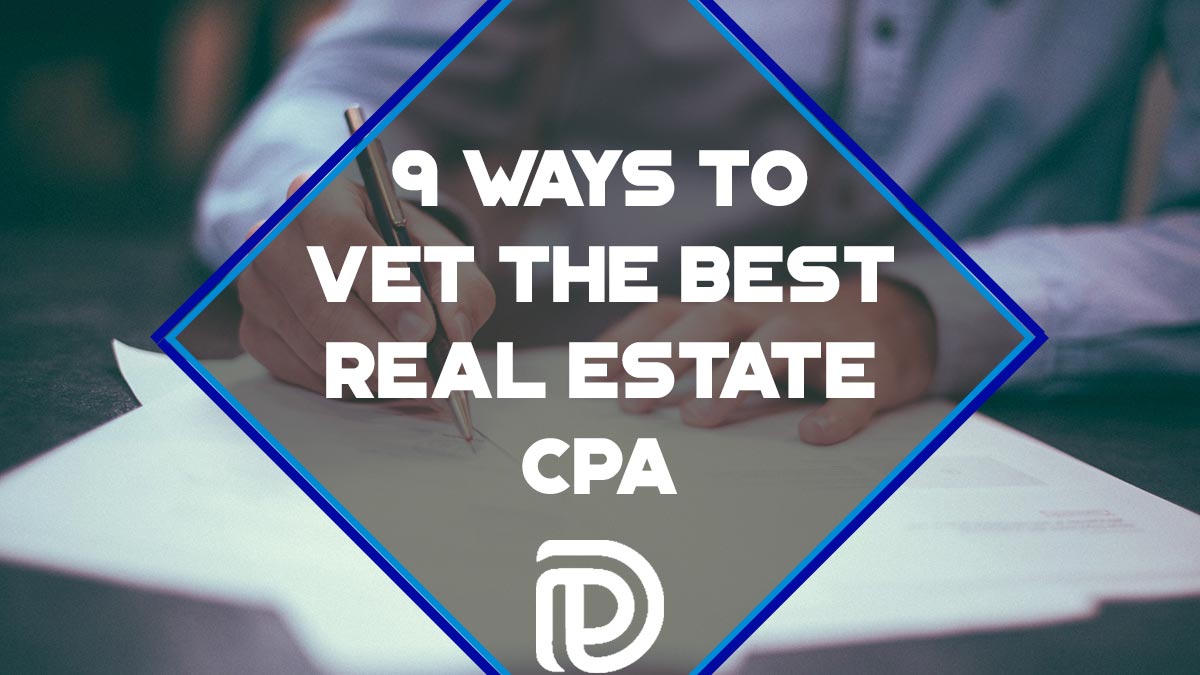One of the main reasons many high-income earners join the Passive Investors Circle is to seek out ways to lower their tax bill by investing in real estate.
Why? They’re tired of paying more and more of their hard-earned money to the IRS as their income continues to climb throughout their careers.
The main goal of this blog is to teach you what we’ve learned from years of investing in passive real estate syndications.
Specifically apartment buildings.
Yes, the tax benefits are fantastic but is your accountant familiar with this type of investing?
If not, should you hire a real estate CPA?
Let’s find out…
Finding a CPA That Fit Your Needs
I’ve had poor eyesight as long as I can remember. When I was 12, I received my first pair of glasses and later transitioned to contacts.
I’ll never forget the first time I tried on a pair of glasses when I was 12…I could actually see the individual blades of grass!
After years of wearing contacts, my eyes became too dry and irritated so I had to resort back to glasses.
Wearing them while trying to exercise and play sports was downright annoying. From the sweat dripping on the lens to having them fog up or breaking, I was ready to get rid of them as soon as possible.
So during my fourth year of dental school at LSU, I sought out one of the top LASIK surgeons in New Orleans to correct my vision. I have to say that to this day, it was probably the best money I’ve ever spent on myself (even though I was a broke student at the time).
When you or a family member is in need of a medical procedure, do you choose the cheapest doctor? Probably not.
More than likely you’re going to seek out the one that:
- comes highly recommended
-
has decades of experience
- loves what they do
- is the MOST skilled that can provide the BEST possible outcome
So why would you use any less scrutiny when dealing with tax issues and choosing a tax advisor?
It’s amazing how many investing forums I’ve visited where doctors and other high-income earners are asking for a list of certified public accountants based on the cheapest price.
Unfortunately you get what you pay for.
Here’s how the average CPA firm operates
Most CPAs look at what happened and report what you did the past year. Many will contact you in January and ask for your numbers for the previous year. The only thing they’re doing is reporting numbers that you already generated and don’t add any type of tax planning strategies.
The only thing they’re focused on is tax preparation and unfortunately this is how the majority of the tax professionals operate.
This is very sad and extremely unhelpful.
A better CPA works as a proactive planning partner that understands your field and tax strategies.
They should:
- communicate with you throughout the year
- encourage you to contact them even with common issues as they arise
- provide the cold hard facts and advice on how you should handle them
By working in this manner, they’ll be able to increase your ROI while saving you real tax dollars year after year.
A proactive CPA will help you follow the “Yellow Brick Road”, also knows as the internal revenue tax code.
If you’re on the right road then the tax laws are your path to great wealth. If not, then you’re heading in the wrong direction and losing money that you shouldn’t be.
- Are you confident you have the right accountant
helping you stay on the path regarding tax obligations? - Can they provide examples and references?
- Do they have extensive experience and do more than just provide tax returns?
- When a new tax law is passed, does it take them weeks or months to give you an update on how it impacts you?
Most CPAs wait for industry articles to be sent to their inbox or even their USPS mail box. Is that indicative of their tax compliance strategy which can materially impact your life? Do they seriously take the trust that you’ve put in them to advise you in ways to help you keep your hard earned money?
Your CPA gets paid regardless of if you owe money or get a refund.
Should you evaluate them based on what they charge or on the value they add along with the actual cash in your pocket after all is said and done?
it’s sad but true but you usually get what you pay for.
If any of this sounds familiar, then you may want to rethink your tax need and planning situation.
Don’t Miss Any Updates. Each week I’ll send you advice on how to reach financial independence with passive income from real estate.
Sign up for my newsletterHow to Pick a Real Estate CPA
I often tell my teenagers that “you don’t know what you don’t know.” The same statement rings true regarding real estate investing.
Most real estate investors know that finding a knowledgeable real estate CPA is more than just “Googling” one nearest you.
As with any other important financial decision, choosing one to work with is a process as there are many factors to consider.
One of the most important factors is finding one who gets the intricacies of various real estate investing strategies. They also understand how important effective long-term strategic planning is.
9 Steps To Vetting a Real Estate CPA
#1 Track record
I feel that one of the most crucial pieces of information that is needed is that the accounting firm has knowledge skill and experience in the real estate field. The longer their track record the better.
Make sure this is one of the first questions you ask of them.
#2 Recommendations
Most of us are accustom to using reviews/recommendations when shopping online.
Obtaining solid recommendations is also important when selecting who’s going to perform your real estate accounting services.
Do they have a diverse range of clients?
One of the best sources are your real estate attorney or other investors in your real estate community.
Networking with other real estate professionals is a great way to find out who they are using for tax services and advice.
#3 Fee structure
Ask potential candidates about how their fees are structured. It’s important to know how you’re charged.
Make sure you ask:
- Will there be fees each time you contact them?
- Do their fees include the tax return at the end of the year or is that separate?
- Do they charge a monthly retainer for conversations?
- How do they structure bookkeeping fees?
#4 Risk tolerance
Consider asking about their stand regarding risk.
- Are they more aggressive or conservative?
- What about your own risk tolerance?
Make sure you align yourself with someone that fits in with your comfort level.
#5 Obtain references
Consider scheduling multiple interviews with several potential CPAs and ask each for references.
If the CPA is good, he or she will not take offense and should readily give you a handful of names to contact.
#6 Proactive tax planning
As mentioned earlier, most CPAs only file taxes. You want more than this as a high-income professional while building a real estate portfolio.
An important question to ask is, “How proactive are you with tax planning and how does your tax planning services work?”
Having a tax strategy can increase cash flow and save you massive amounts of money over the course of your career.
#7 Be patient
Rank the candidates in order then take your time choosing the best one that aligns with your needs.
Consider avoiding any CPA who does not make you comfortable.
#8 Point person
You may spend your initial interview with the CPA themselves but what about if you become a client?
It’s important to find out all individuals that you’ll be communicating with especially if they have a point person that handles most issues.
#9 Client expectations
What about you? Thus far we’ve focused on what’s involved if we hire the candidate but we should also ask them what they expect of you as a client.
Expectations should be set early and communicated clearly.
Bottom Line
As a high-income earner, taxes will be your LARGEST expense throughout your career.
It’s for this reason that many look to real estate investing (specifically rental losses) to help lower their overall tax burden.
Finding and performing due diligence on a real estate CPA is one of the biggest and most important decisions you’ll make.
Make sure you do your homework, obtain references and obtain background checks to help you find the right one that best suits your real estate investing goals.
Join the Passive Investors Circle








